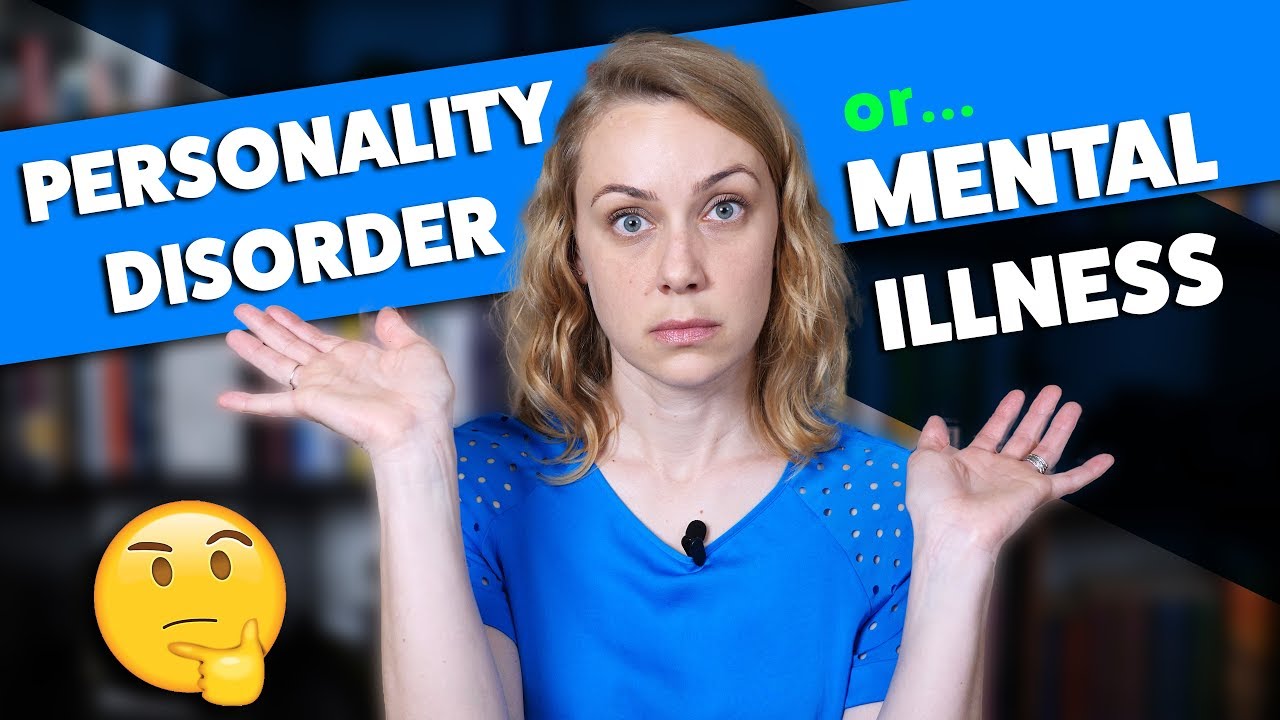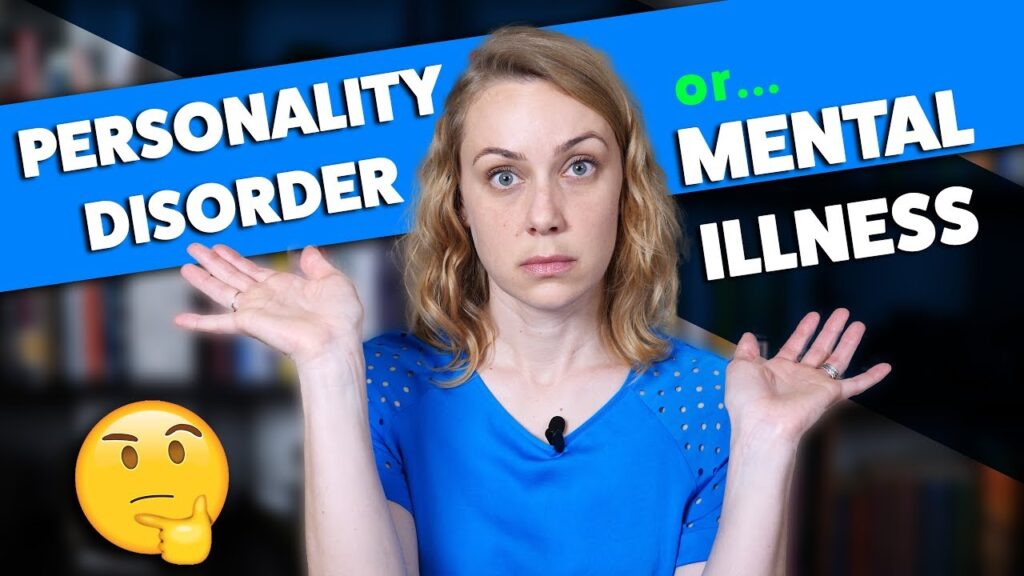The Difference Between Mental Illness and Personality Disorders: How to Understand and Manage Your Symptoms

Understanding the Complexity of Mental Health

Mental health is a complex and multifaceted aspect of human well-being, encompassing a wide range of emotions, thoughts, and behaviors. It is influenced by various factors, including genetics, environmental factors, and individual experiences. Understanding the complexity of mental health is crucial in order to provide effective support and interventions for those in need.
One key aspect of mental health is the distinction between mental illness and personality disorders. While both can significantly impact an individual’s emotional and psychological well-being, they differ in their manifestation and diagnostic criteria. Mental illnesses, such as depression or anxiety disorders, involve disruptions in mood, cognition, and behavior. On the other hand, personality disorders, like borderline personality disorder or narcissistic personality disorder, are characterized by enduring patterns of maladaptive thoughts, emotions, and behaviors that significantly impair an individual’s functioning and relationships.
To develop a comprehensive understanding of mental health, it is essential to explore the diagnostic criteria for various mental illnesses and personality disorders. Diagnostic manuals, such as the Diagnostic and Statistical Manual of Mental Disorders (DSM-5), provide detailed criteria for diagnosing these conditions. By familiarizing ourselves with these criteria, we can identify common symptoms, traits, and signs that indicate the presence of specific mental health challenges. This knowledge enables healthcare professionals and individuals alike to seek timely intervention and appropriate treatments to improve overall well-being.
Recognizing the Distinction between Mental Illness and Personality Disorders

Mental illness and personality disorders are two distinct categories within the field of mental health, although they may share some similarities in terms of symptoms and impacts on individuals. Understanding the distinction between these two can help individuals and professionals navigate the complexities of mental health more effectively.
Mental illness refers to a wide range of conditions that affect a person’s thinking, mood, behavior, and overall functioning. These conditions are typically diagnosed based on specific criteria outlined in the Diagnostic and Statistical Manual of Mental Disorders (DSM-5), which is widely used by mental health professionals. Some common mental illnesses include depression, anxiety disorders, bipolar disorder, schizophrenia, and obsessive-compulsive disorder. These conditions often have biological, psychological, and environmental causes, and they can significantly disrupt a person’s daily life.
On the other hand, personality disorders are a distinct category of mental health conditions characterized by patterns of unhealthy thinking, behavior, and interpersonal relationships. These patterns are deeply ingrained and can often be traced back to childhood or early adulthood. Personality disorders, unlike mental illnesses, are generally considered to be long-standing and pervasive, affecting a person’s overall personality and sense of self. Examples of personality disorders include borderline personality disorder, narcissistic personality disorder, and antisocial personality disorder. It is important to note that while individuals with personality disorders may exhibit symptoms of mental illness, not all individuals with mental illness have a personality disorder.
Recognizing the distinction between mental illness and personality disorders can help individuals and their loved ones better understand the challenges they face and seek appropriate treatment. It is crucial to consult with mental health professionals for an accurate assessment and diagnosis, as well as for developing an individualized treatment plan that encompasses both the mental health condition and any underlying personality factors. By gaining a better understanding of these distinctions, we can promote greater empathy, reduce stigma, and facilitate more effective support and intervention for those in need.
Exploring the Diagnostic Criteria for Mental Illnesses

Mental illnesses are complex conditions that can significantly impact a person’s thoughts, emotions, and behaviors. To accurately diagnose these conditions, mental health professionals rely on a set of diagnostic criteria outlined in the Diagnostic and Statistical Manual of Mental Disorders (DSM-5). The DSM-5 is a widely recognized manual that provides criteria for the classification and diagnosis of mental illnesses.
The diagnostic criteria for mental illnesses involve a thorough assessment of an individual’s symptoms, duration, and severity. Mental health professionals consider a range of factors, including the presence of specific symptoms, the impact of those symptoms on daily functioning, and the exclusion of any other potential causes. By adhering to these criteria, clinicians can make informed diagnoses and develop appropriate treatment plans for individuals experiencing mental health challenges. It is also important to note that the diagnostic criteria are constantly evolving as new research and understanding of mental illnesses emerge.
Examining the Diagnostic Criteria for Personality Disorders
Personality disorders are a complex category of mental health conditions that affect an individual’s thoughts, emotions, and behaviors. These disorders are characterized by enduring patterns of behavior and inner experiences that significantly differ from societal norms and expectations. The Diagnostic and Statistical Manual of Mental Disorders, Fifth Edition (DSM-5), outlines specific diagnostic criteria for various personality disorders, which help clinicians accurately identify and treat these conditions.
One of the personality disorders outlined in the DSM-5 is borderline personality disorder (BPD). Individuals with BPD often struggle with unstable interpersonal relationships, intense emotions, and a distorted sense of self. To meet the diagnostic criteria for BPD, an individual must exhibit pervasive patterns of instability in interpersonal relationships, self-image, and affect, as well as markedly impulsive behaviors that repeatedly put them at risk. It’s important to note that a diagnosis of any personality disorder requires the evaluation of a qualified mental health professional, as they rely on thorough assessments and clinical judgment to make accurate diagnoses.
Another personality disorder that falls within the DSM-5 diagnostic criteria is narcissistic personality disorder (NPD). Individuals with NPD typically show a grandiose sense of self-importance, a need for admiration, and a lack of empathy for others. These characteristics must be exhibited across multiple contexts and accompanied by a sense of entitlement and a pattern of arrogant or haughty behavior. Diagnostic criteria also consider the impairment in functioning caused by these traits and the distress experienced by individuals themselves or those around them. As with all personality disorders, the diagnosis of NPD requires careful evaluation and professional judgment.
Understanding the diagnostic criteria for personality disorders can help individuals and their loved ones to recognize the signs and symptoms that may indicate the presence of these conditions. However, it is essential to remember that only qualified mental health professionals can provide an accurate diagnosis. If you suspect that you or someone you know may be experiencing symptoms of a personality disorder, it is crucial to seek professional help for a comprehensive evaluation and appropriate treatment.
Certainly! Here’s a table summarizing the general diagnostic criteria for personality disorders:
| General Criteria for Personality Disorders | Description | Source of Information |
|---|---|---|
| Pattern of Inflexible and Maladaptive Behavior | The individual displays persistent and pervasive behaviors that are resistant to change and disrupt daily life. | DSM-5 – American Psychiatric Association |
| Onset and Stability | The maladaptive pattern of behavior typically emerges in adolescence or early adulthood and remains consistent. | DSM-5 – American Psychiatric Association |
| Deviation from Cultural Expectations | The individual’s behavior significantly contrasts with societal norms and cultural expectations. | DSM-5 – American Psychiatric Association |
| Pervasive and Inflexible | The personality disorder is not a result of another mental disorder or attributable to a medical condition. | DSM-5 – American Psychiatric Association |
| Impairment in Interpersonal and Social Functioning | The maladaptive behavior causes significant distress or impairment in relationships, work, or other areas of life. | DSM-5 – American Psychiatric Association |
The Impact of Mental Illness on an Individual’s Thoughts and Emotions
Mental illness can have a profound impact on an individual’s thoughts and emotions, often leading to significant changes in their cognitive and emotional processes. One of the key effects of mental illness on thoughts is the disruption of rational thinking patterns. For instance, individuals with depression may experience persistent negative thoughts and a distorted perception of reality, leading to feelings of hopelessness and worthlessness. Similarly, anxiety disorders can cause excessive worry and rumination, making it difficult for individuals to focus and concentrate on daily tasks. These altered thought patterns can significantly impact a person’s overall well-being and quality of life.
In addition to affecting thoughts, mental illness can also have a substantial impact on emotions. Those affected may experience intense and overwhelming emotions that are often difficult to manage. For example, individuals with bipolar disorder may go through periods of extreme highs (mania) and lows (depression), experiencing intense joy, irritability, sadness, or emptiness. Similarly, individuals with borderline personality disorder may frequently experience intense and unstable emotions, often leading to difficulties in managing anger, impulsivity, and emotional stability. The emotional rollercoaster caused by mental illness can make it challenging for individuals to regulate their emotions and engage in healthy coping strategies. Consequently, these emotional disturbances can severely impact an individual’s relationships, daily functioning, and overall quality of life.
Understanding the impact of mental illness on thoughts and emotions is crucial for both individuals experiencing these challenges and their loved ones. By recognizing and acknowledging these effects, it becomes possible to seek appropriate support, treatment, and coping strategies to promote mental well-being and enhance overall life satisfaction.
How Personality Disorders Affect an Individual’s Behavior and Relationships
Personality disorders have a profound impact on an individual’s behavior and relationships, often causing significant distress and impairment in daily life. These disorders are characterized by long-standing patterns of maladaptive thoughts, feelings, and behaviors that deviate from societal norms. As a result, individuals with personality disorders may struggle with interpersonal relationships, experiencing difficulties in maintaining close connections and engaging in healthy social interactions.
One common way that personality disorders affect behavior is through the manifestation of patterns of excessive or inappropriate emotional responses. For example, individuals with borderline personality disorder may struggle with intense and unstable emotions, often experiencing episodes of rage, depression, or anxiety that are disproportionate to the situation at hand. These emotional rollercoasters can strain relationships, as the erratic nature of their emotional states makes it challenging for those around them to remain supportive and understanding.
In addition to emotional dysregulation, personality disorders can also lead to patterns of impulsive and reckless behavior. This can manifest as frequent episodes of binge eating or spending money impulsively, engaging in risky sexual behaviors, or having substance abuse issues. These impulsive behaviors can take a toll on relationships, disrupting trust and stability.
Furthermore, individuals with personality disorders often struggle with distorted thoughts and beliefs about themselves and others. These cognitive patterns can lead to difficulties in interpreting social cues accurately, contributing to challenges in forming and maintaining healthy relationships. For example, individuals with paranoid personality disorder may have an excessive distrust of others, leading to difficulties in forming close connections due to their constant suspicion.
It is important to note that the impact of personality disorders on behavior and relationships can vary greatly depending on the specific disorder and its severity. Seeking professional help from mental health experts is essential for accurately diagnosing and effectively managing personality disorders, ultimately improving individuals’ quality of life and their ability to build and maintain meaningful relationships.
Certainly! Here’s a table summarizing how personality disorders can affect an individual’s behavior and relationships:
| Effects of Personality Disorders on Behavior and Relationships | Description | Source of Information |
|---|---|---|
| Difficulty Establishing and Maintaining Relationships | Individuals with personality disorders may struggle to form and sustain healthy relationships due to challenges in social interactions. | Psychiatric Annals. 2018 May;48(5):230-238 |
| Impaired Interpersonal Functioning | Personality disorders often involve difficulties with empathy, intimacy, and effective communication, impacting the ability to connect with others. | The Journal of Nervous and Mental Disease. 2015 Sep;203(9):664-8 |
| Fear of Abandonment | Some personality disorders, such as borderline personality disorder (BPD), may manifest as an intense fear of abandonment, leading to clinginess or impulsive behaviors. | Journal of Personality Disorders. 2011 Apr;25(2):208-21 |
| Impulsivity and Emotional Dysregulation | Impulsive behaviors and difficulty regulating emotions are common features in several personality disorders, contributing to relationship instability. | Journal of Clinical Psychology. 2016 Jul;72(7):692-705 |
| Trust Issues and Paranoia | Individuals with certain personality disorders may struggle with trust, experiencing paranoia and suspicion, impacting relationship dynamics. | Personality Disorders: Theory, Research, and Treatment. 2014 Apr;5(2):198-205 |
| Manipulative or Controlling Behaviors | Certain personality disorders, such as narcissistic or antisocial personality disorder, may involve manipulative or controlling behaviors in relationships. | Journal of Personality Disorders. 2012 Feb;26(1):19-33 |
| Isolation and Social Withdrawal | Individuals with personality disorders may isolate themselves due to difficulties in social interactions, leading to loneliness and a lack of support. | Comprehensive Psychiatry. 2015 Aug;61:52-60 |
| Difficulty Adapting to Changes | Rigidity and resistance to change are common traits in some personality disorders, making it challenging to adapt to evolving situations in relationships. | Journal of Abnormal Psychology. 2019 Jan;128(1):1-9 |
Common Symptoms and Signs of Mental Illness
Mental illness encompasses a wide range of conditions that can affect a person’s thoughts, emotions, and behaviors. While each individual may experience mental illness differently, there are common symptoms and signs that can indicate the presence of a mental health condition. These symptoms can vary depending on the specific disorder, but some of the most commonly reported signs of mental illness include persistent feelings of sadness or hopelessness, changes in sleep patterns, such as insomnia or excessive sleep, intense feelings of anxiety or fear, difficulty concentrating or making decisions, and changes in appetite or weight.
In addition to these emotional and cognitive symptoms, physical symptoms can also be present in individuals with mental illness. These can include headaches, stomachaches, and other unexplained physical complaints. It’s important to note that the presence of these symptoms does not necessarily mean that a person has a mental health disorder, as they can also be indicative of other medical conditions. However, if these symptoms persist and significantly impact an individual’s daily functioning, it is recommended to seek professional help to determine if a mental health condition may be present.
Identifying Key Symptoms and Traits of Personality Disorders
Personality disorders are characterized by long-standing patterns of thinking, feeling, and behaving that deviate from societal norms. They can significantly impact an individual’s ability to maintain healthy relationships and navigate various aspects of life. Identifying key symptoms and traits of personality disorders is crucial in order to recognize these conditions and seek appropriate treatment.
One common personality disorder is borderline personality disorder (BPD). Individuals with BPD often experience intense mood swings, unstable self-image, and significant difficulties in controlling their emotions. They may also engage in impulsive and self-destructive behaviors, have unstable relationships, and fear abandonment. Other personality disorders, such as narcissistic personality disorder and antisocial personality disorder, have their own distinct symptoms and traits. For example, individuals with narcissistic personality disorder may display excessive self-importance, a lack of empathy for others, and a need for constant admiration. On the other hand, those with antisocial personality disorder may exhibit a disregard for the rights of others, a lack of remorse, and a propensity for deceitful and manipulative behavior.
Identifying these key symptoms and traits is essential for early intervention and proper diagnosis. By understanding the specific characteristics of different personality disorders, individuals and healthcare professionals can devise appropriate treatment plans and interventions that address the unique challenges posed by these conditions. It is important to note that only trained professionals can accurately diagnose personality disorders and that a comprehensive evaluation is necessary for an accurate diagnosis.
The Role of Genetics and Environmental Factors in Mental Health Disorders
Genetics and environmental factors play a crucial role in the development of mental health disorders. Research has shown that certain genetic variations can increase the susceptibility to mental illnesses such as depression, anxiety, bipolar disorder, and schizophrenia. These genetic factors can affect the functioning of neurotransmitters, brain structure, and the regulation of emotions, leading to an increased risk of developing mental health conditions.
In addition to genetics, environmental factors also contribute significantly to the development of mental health disorders. Adverse childhood experiences, such as trauma, abuse, neglect, and socioeconomic factors, can greatly impact an individual’s mental well-being. Other environmental factors, such as chronic stress, substance abuse, and social isolation, can also increase the vulnerability to mental health conditions.
It is important to note that while genetics and environmental factors play a role in the development of mental health disorders, they are not the sole determinants. It is a complex interplay of various biological, psychological, and social factors that contribute to the onset and progression of these conditions. By understanding the role of genetics and environmental factors, we can better comprehend the complexity of mental health and work towards effective prevention and treatment strategies.
Understanding the Importance of Early Intervention and Diagnosis
Early intervention and early diagnosis play a crucial role in the management of mental health conditions. Recognizing the signs and symptoms of a mental illness or personality disorder at an early stage can significantly improve the prognosis and increase the chances of successful treatment. When left untreated, these conditions can have a profound impact on an individual’s daily life, relationships, and overall well-being.
By seeking help and receiving a timely diagnosis, individuals can access appropriate treatments and support services tailored to their specific needs. Studies show that early intervention can reduce the severity and duration of symptoms, enhance recovery, and prevent potential complications. It can also reduce the risk of relapse and hospitalization, improving an individual’s overall quality of life. Thus, recognizing the importance of early intervention and diagnosis is key to addressing mental health conditions effectively and optimizing long-term outcomes.
Effective Strategies for Managing Mental Illness Symptoms
Managing mental illness symptoms can be a challenging and complex task. However, with the right strategies in place, individuals can find ways to effectively cope with their symptoms and improve their overall well-being. One key strategy is developing a personalized treatment plan in collaboration with a mental health professional.
A personalized treatment plan typically includes a combination of therapy, medication, and self-care practices. Cognitive-behavioral therapy (CBT) is often recommended for managing mental illness symptoms as it helps individuals identify and change negative thought patterns and behaviors. Additionally, medications may be prescribed to alleviate specific symptoms or target underlying chemical imbalances in the brain.
In addition to therapy and medication, incorporating self-care practices into daily routines is crucial for managing mental illness symptoms. This may involve engaging in regular exercise, practicing mindfulness and relaxation techniques, maintaining a balanced diet, and getting enough quality sleep. It is also important to prioritize self-care activities that bring joy and fulfillment, such as hobbies or spending time with loved ones.
By working closely with mental health professionals and implementing personalized treatment plans that incorporate therapy, medication, and self-care practices, individuals can gain greater control over their mental illness symptoms. It is important to remember that managing mental illness is an ongoing process, and staying committed to the strategies that work best for each individual can greatly improve their overall quality of life.
Coping Techniques for Individuals with Personality Disorders
Coping Techniques for Individuals with Personality Disorders
Living with a personality disorder can be challenging, but there are coping techniques that can help individuals manage their symptoms and improve their quality of life. One effective strategy is engaging in stress-reducing activities such as mindfulness meditation, deep breathing exercises, and progressive muscle relaxation. These techniques can help individuals with personality disorders regulate their emotions, reduce anxiety, and increase overall well-being. It is also important for individuals to establish a routine and maintain a healthy lifestyle, including regular exercise, sufficient sleep, and a balanced diet. These practices can promote stability and mental clarity, making it easier to cope with the challenges associated with personality disorders.
In addition to self-help techniques, seeking support from others can be beneficial for individuals with personality disorders. Connecting with a support group or therapy can provide a safe space where individuals can share their experiences and learn from others who are facing similar challenges. Therapy, such as cognitive-behavioral therapy, can also help individuals with personality disorders develop healthy coping mechanisms, challenge negative thought patterns, and improve their ability to manage stress and maintain healthy relationships. With the right professional guidance and support, individuals with personality disorders can learn to navigate their condition and lead fulfilling lives.
Seeking Professional Help and Treatment Options for Mental Health Conditions
Seeking professional help and exploring treatment options for mental health conditions is an important step towards healing and recovery. Mental health disorders can greatly impact an individual’s overall well-being, relationships, and quality of life. Fortunately, there are various professionals and resources available to provide support and guidance.
One of the first steps in seeking professional help is finding a mental health provider who specializes in the specific condition or concern you may be experiencing. This can be a psychiatrist, psychologist, or therapist who has expertise in diagnosing and treating mental health conditions. They will conduct an initial assessment to gather information about your symptoms, medical history, and personal background. From there, they can develop a personalized treatment plan that may involve therapy, medication, or a combination of both.
In addition to individual therapy, group therapy and support groups can also be beneficial for individuals struggling with mental health conditions. These settings provide a space for individuals to connect with others who have similar experiences, share coping strategies, and receive support and encouragement. Additionally, support from family members, friends, and loved ones can play a crucial role in one’s recovery journey.
It is important to remember that seeking professional help is not a sign of weakness, but rather a brave and proactive step towards healing. Mental health conditions are treatable, and with the right support, individuals can experience significant improvements in their symptoms and overall well-being.
The Stigma Surrounding Mental Illness and Personality Disorders
The stigma surrounding mental illness and personality disorders remains a significant barrier in our society. Despite advances in understanding and awareness, there is still a pervasive misunderstanding and discrimination that affects those who are affected by these conditions. This stigma can manifest in various ways, from subtle biases and stereotypes to outright discrimination and exclusion.
Many individuals with mental illness and personality disorders face judgment and disbelief regarding their experiences. They may encounter skepticism or dismissive attitudes from others, making them hesitant to seek help or discuss their struggles openly. This stigma can also lead to self-stigmatization, where individuals internalize negative attitudes and feel ashamed or unworthy.
It is crucial to recognize that mental illness and personality disorders are legitimate medical conditions that can impact a person’s thoughts, emotions, behavior, and overall well-being. There is an urgent need to challenge the societal stigma by promoting education, empathy, and understanding. By fostering an environment of acceptance and support, we can help individuals affected by these conditions to confidently seek treatment, break free from the shackles of stigma, and lead fulfilling lives.
Building a Support System and Engaging in Self-Care Practices
Building a support system is crucial for individuals who are dealing with mental health issues or personality disorders. Having a strong network of family, friends, and professionals can provide much-needed emotional support and guidance throughout the journey of recovery. It is important to surround oneself with understanding and compassionate individuals who can offer non-judgmental listening and encouragement.
In addition to the support of loved ones, self-care practices are vital for maintaining overall mental well-being. Engaging in activities that promote relaxation and self-reflection, such as mindfulness exercises or journaling, can help manage stress and improve emotional resilience. Taking care of one’s physical health through regular exercise, a balanced diet, and adequate sleep is also essential. Additionally, seeking professional help, such as therapy or counseling, can provide valuable tools and strategies for coping with challenges and building resilience. By building a strong support system and prioritizing self-care, individuals can foster a positive environment that promotes healing and growth.
How can I build a support system for my mental health?
Building a support system involves reaching out to trusted friends, family members, or support groups who can provide emotional support and understanding. It is important to communicate your needs and boundaries, and to seek professional help when necessary.
What are some self-care practices that can help improve mental health?
Self-care practices can include activities such as practicing mindfulness or relaxation techniques, engaging in regular exercise, maintaining a balanced diet, getting enough sleep, and engaging in activities that bring joy and relaxation.
Is there a difference between mental illness and personality disorders?
Yes, there is a distinction between mental illness and personality disorders. Mental illness refers to a wide range of conditions that affect a person’s thinking, mood, and behavior. Personality disorders, on the other hand, are a specific type of mental health disorder characterized by enduring patterns of behavior, thoughts, and emotions that deviate from cultural norms.
What are some common symptoms of mental illness?
Common symptoms of mental illness can vary depending on the specific condition but may include changes in mood, feelings of sadness or hopelessness, difficulty concentrating, changes in appetite or sleep patterns, and withdrawal from social activities.
How can genetics and environmental factors contribute to mental health disorders?
Genetics and environmental factors both play a role in the development of mental health disorders. While certain genetic factors may predispose individuals to certain conditions, environmental factors such as trauma, stress, or substance abuse can also contribute to the onset of mental health disorders.
What are some effective strategies for managing symptoms of mental illness?
Strategies for managing symptoms of mental illness can include seeking therapy or counseling, practicing stress management techniques, engaging in regular exercise, maintaining a healthy lifestyle, and taking prescribed medications as directed by a healthcare professional.
How can individuals with personality disorders cope with their condition?
Coping techniques for individuals with personality disorders may involve therapy or counseling, learning healthy communication and coping skills, setting boundaries, practicing self-care, and seeking support from loved ones or support groups.
When should I seek professional help for mental health conditions?
It is important to seek professional help if you are experiencing symptoms of mental illness that are significantly impacting your daily life, relationships, or overall well-being. Additionally, if you are in crisis or have thoughts of self-harm or suicide, it is crucial to reach out to a healthcare professional or helpline immediately.
How can I overcome the stigma surrounding mental illness and personality disorders?
Overcoming the stigma surrounding mental illness and personality disorders involves educating oneself and others about these conditions, sharing personal stories to reduce stereotypes, advocating for mental health awareness, and promoting a culture of acceptance and support.
How can early intervention and diagnosis be helpful in managing mental health conditions?
Early intervention and diagnosis in mental health conditions can lead to more successful treatment outcomes and better overall management of symptoms. It allows individuals to access appropriate support, resources, and treatment options at an early stage, potentially preventing the condition from worsening or becoming more difficult to manage.






